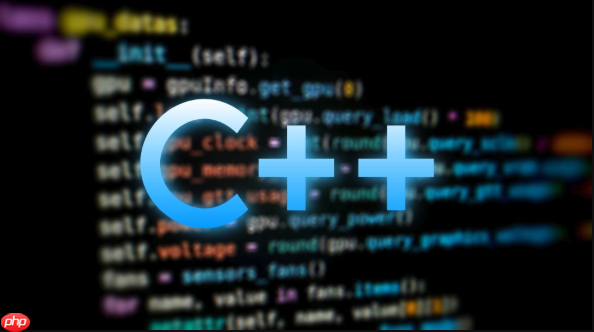C++20推荐使用std::format进行类型安全的格式化输出,支持类似Python的语法,如{}占位符和{:.2f}精度控制,需包含头文件。1. std::format具备编译时检查、命名参数(实验性)和良好可读性,MSVC支持较好,GCC需C++20且版本13+更完整。2. 传统流操作通过std::ostringstream结合实现,类型安全但代码冗长,适用于旧标准项目。3. C风格printf/sprintf性能高但易引发缓冲区溢出和类型错误,建议仅在性能敏感且输入可控时使用snprintf替代。4. 第三方fmt库是std::format前身,语法一致,支持C++11以上,兼容性强,被spdlog等广泛采用。综上,优先选择std::format,否则用fmt库或流操作,避免裸用printf系列。

在C++中,格式化输出字符串是日常开发中的常见需求。传统方法依赖于C风格的printf或流操作,但随着C++20引入std::format,我们有了更安全、更灵活的选择。下面介绍几种主流方式,重点讲解std::format的用法。
std::format是C++20标准库中引入的现代化格式化工具,语法类似Python的str.format(),支持类型安全和编译时检查(部分实现),避免了printf类函数的类型不匹配问题。
要使用std::format,需包含头文件<format></format>:
#include <iostream>
#include <format>
#include <string>
int main() {
std::string name = "Alice";
int age = 30;
double height = 1.68;
std::string result = std::format("姓名:{},年龄:{},身高:{:.2f}米", name, age, height);
std::cout << result << std::endl;
// 输出:姓名:Alice,年龄:30,身高:1.68米
return 0;
}
说明与建议:
立即学习“C++免费学习笔记(深入)”;
{},按参数顺序自动填充。{:.2f}表示浮点数保留两位小数。{name}配合std::make_format_args。std::format支持较好,GCC需启用-std=c++20并注意版本(9以上部分支持,13+更完整)。在C++20之前,常用std::ostringstream进行格式化,适合复杂拼接场景。
#include <iostream>
#include <sstream>
#include <iomanip>
int main() {
std::ostringstream oss;
oss << "编号:" << 1001
<< ",价格:" << std::fixed << std::setprecision(2) << 99.9;
std::cout << oss.str() << std::endl;
// 输出:编号:1001,价格:99.90
return 0;
}
说明与建议:
立即学习“C++免费学习笔记(深入)”;
<iomanip></iomanip>来控制精度、进制等。来自C语言的传统方式,简单直接,但存在安全隐患。
#include <cstdio>
#include <cstring>
int main() {
char buffer[256];
int id = 1001;
double price = 99.9;
std::sprintf(buffer, "编号:%d,价格:%.2f", id, price);
std::puts(buffer);
return 0;
}
说明与建议:
立即学习“C++免费学习笔记(深入)”;
snprintf替代sprintf)。fmt库是std::format的实现基础,功能强大,支持C++11及以上,兼容性好。
安装后使用:
#include <fmt/core.h>
#include <iostream>
int main() {
std::string result = fmt::format("用户 {} 登录了,时间:{}", "Bob", "10:30");
std::cout << result << std::endl;
return 0;
}
说明与建议:
立即学习“C++免费学习笔记(深入)”;
std::format几乎一致。基本上就这些。如果项目支持C++20,优先使用std::format;否则考虑fmt库或流操作。避免裸用printf系列,除非有特殊理由。
以上就是C++如何格式化输出字符串_C++格式化输出方法与std::format用法的详细内容,更多请关注php中文网其它相关文章!

每个人都需要一台速度更快、更稳定的 PC。随着时间的推移,垃圾文件、旧注册表数据和不必要的后台进程会占用资源并降低性能。幸运的是,许多工具可以让 Windows 保持平稳运行。

Copyright 2014-2025 https://www.php.cn/ All Rights Reserved | php.cn | 湘ICP备2023035733号